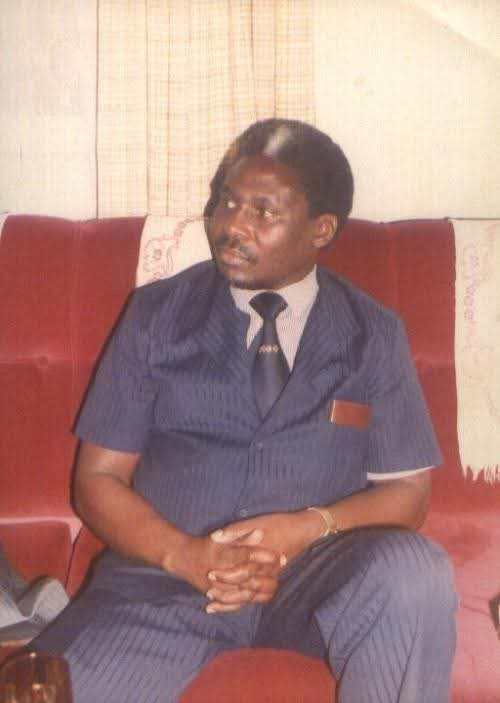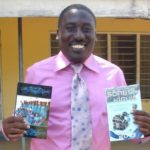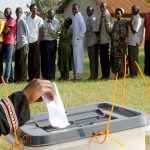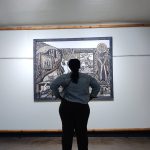The heat bore down in waves of wet humidity on that sweltering, sweat-swept morning.
Beads of perspiration collected on my brow, even though I was indoors.
Outside, I saw a column of dust churning its way heavenward.
I was getting ready for my first day as an A-level student.
And since my father was indisposed, an “uncle” offered to get behind the wheel of dad’s car and drop me at school instead.
But he hadn’t arrived yet.
So I was restless.
Not only because I anxiously awaited his arrival, but also because I was secretly hoping that he wouldn’t arrive.
For he was a windbag, and I didn’t feel like travelling with him on a journey that would thus fill long empty hours with vacant conversation.
A few hours later, when afternoon had arrived, he still hadn’t come.
And my mother told my father so.
When my father heard the news, he was furious.
He thus sprang out of bed like a man possessed and declared that he’d drive me himself!
As he dressed up, his eyes were still luminous with fury.
“If you want something to be done, you have to do it yourself. Let’s go!” he said with theatrical flourish to mother and me.
So we piled into the car for the two hour journey into the sunset.
As we swept along the highway, my parents were locked in animated conversation.
Their talk orbited about ‘unreliable relatives’, with a smattering of segues into Ugandan politics.
As they spoke, I held my tongue.
An unexplained sense of foreboding swept all over me.
Something seemed amiss.
“Philip, you don’t talk?” my father asked, looking over his shoulder at me.
I still didn’t say a word.
The road was shoulder-lined by rolling country that wove a frantic kind of beauty into the fabric of the passing scenery.
Yet, a somberness crawled across the rustic landscape as rural folk lived cheek by jowl with abject poverty.
“You have to eat something before you go to school, an empty stomach never agrees with learning,” my father said as we turned off the road on to a gravelly passage that served as an approach to a small ‘town’.
Here, a row of single-storied structures with brick facings and cheap corrugated awnings stood to attention like a muted receiving line for arriving heads of state.
We walked into one of these, an eatery.
It was a cheap haunt with a half-verandah, a motley of wooden benches set by tables that seemed to have served a lot of stiff and sour food.
A beaming if flustered waitress quickly wiped the table.
Then, hiding the cloth behind her back, asked us what we would have.
With my parents dressed to the nines for a meal at the Hilton, the waitress knew she wasn’t dealing with her everyday patrons.
Dad, however, always knew how to blend into places high and low.
In fact, some guests at home would invariably be shocked when they would find him house-proudly sweeping and mopping while we, his spoilt children, passively looked on.
Dad was the kind of man who stood on the highest peak, but kept his feet firmly on the ground.
When I would wax revolutionary about changing the world, he’d hand me a broom.
“First sweep it, the world is in need of cleaning and not posturing,” he would quip.
Indeed, he lived a Spartan, monastic life with his tailor-made suits and electronic gadgetry being his only indulgences.
He had learnt to get by on very little as a boy freezing in the village morning mist.
As he grew up, he became a gadfly…knowing what he was against and not exactly what he was for.
And so he refused to truck with leaders he considered tyrants, splitters, place seekers, fun men, careerists and agents provocateurs.
Naively ignoring that these selfsame “leaders” were largely what his country had to offer.
As one scholar would put it: his understanding of man paled in insignificance when compared to his misunderstanding of men.
Soon, they labeled him obstructionist and inflammatory: an outlaw cast into a life of outlawry without breaking a single law.
Still, he liked getting into such flaps were there could be no retreat.
Because these battles tested his resolve, much as the bitter village cold did when he was but a child.
Flash forward: as we ate a surprisingly good meal in that roadside eatery, a thick-set, pie-bald man with a head like a bullfrog’s brushed past us.
My father looked up at this hulking man and nodded an unspoken greeting.
Moments later, we were back on the open road.
For the whole year, my father was harried by the pre-sentiment that he would die soon.
So he was deeply pre-occupied with the past like a man walking backwards towards the opposite side of eternity.
Not wanting to see what his grim fate actually was, yet knowing it all along.
This day was no different.
“What a life some of us have lived. Philip, do you think you can live such a life? Yours seems like a mere storm in the tea cup…” he mused.
Sure, his life was organic and surpassingly singular.
For he had constantly jousted with death and, at some point, must have believed that he had won.
Indeed, his unsaid credo might have echoed a popular gangster saying that went: “Live fast, die young and leave a good-looking corpse.”
The thorny political road he had traveled was fraught with danger.
My existence, on the other hand, had been sheltered, protected.
It was a like a crenellated castle surrounded by a moat and an extensive bodyguard of do’s and don’ts.
I could be stubborn and self-willed too, however.
But not like dad.
He doggedly ran head-on into an obstacle.
To be sure, he did so repeatedly until even the imaginary tweetie birds circling his wounded head would get dizzy!
We were soon parked outside the school.
But the car got stuck in a ditch and some students presently helped us heave it out.
After I had put my personal effects in the dormitory, I came out to say goodbye to my folks.
Just then, I knew why I had been quiet all day.
The weeks leading up to this day were given to a whirlpool of emotions.
And an inner surge of happiness, anger, grief, confusion, fear, elation, courage, illusion and disillusion had not yet been canalized by me.
So a surreal, melancholy cast was lent to our family portrait.
As my father reversed the car, something caught in my throat as I whispered goodbye.
He steered towards the gate, and then stopped momentarily, as if he had forgotten something.
I waved limply again, and my mother smiled back radiantly.
But my father was this time focused on the road ahead…to wherever it may turn.
He thus drove off without waving back.
Maybe he knew that his sojourn was over.
For our goodbye was actually a farewell.
And like a comet streaking through life’s night, he was gone.
This post was created with our nice and easy submission form. Create your post!








